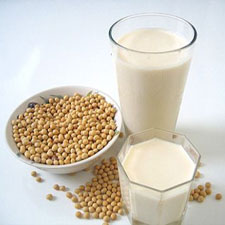Soy Diet

The most prominent forms of soy are tofu, soymilk, soy flour, textured soy protein, tempeh and miso. They can be used as substitutes in recipes that are normally made with some sort of animal protein. To favorably impact heart health, the Food and Drug Administration recommends 25 grams of soy a day. Four ounces of tofu has 13 grams of soy protein while a one-ounce glass of soymilk contains 10 grams of protein.
For those unfamiliar with the tastes of soy, gradually introduce it into the diet by using soy flour in place of white flour. Use soymilk with breakfast cereals or when preparing baked goods. Add tofu into a stir-fry or enjoy it on crackers.
While the popularity of soy has increased over the years, the verdict is still out as there are concerns over the food among the medical community. Soy contains a hemagglutinin which causes red blood cells to clump together. It also has goitrogens, substances that interfere with thyroid function. Research suggests that diets which gets rid of meat and dairy and replace them with soy lead to mineral deficiencies.
